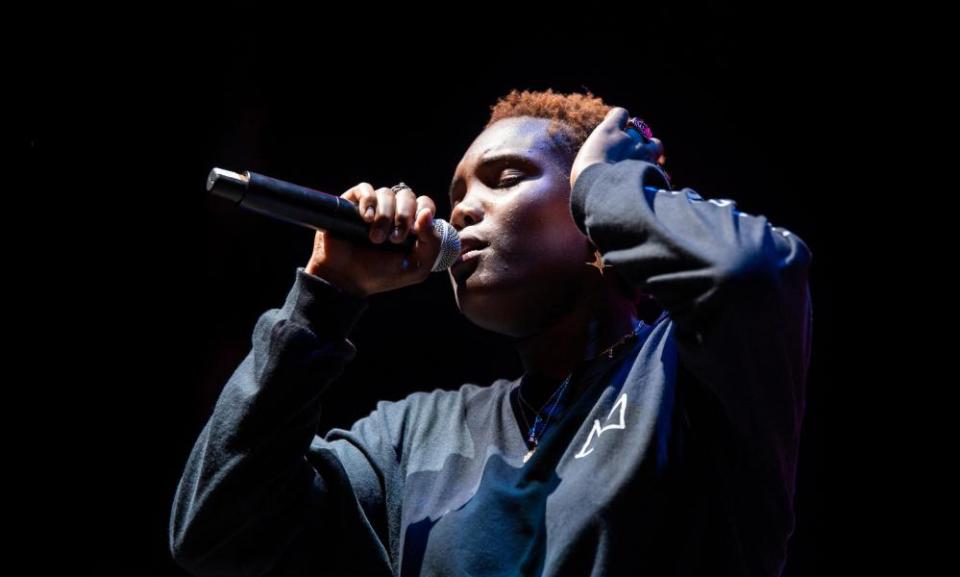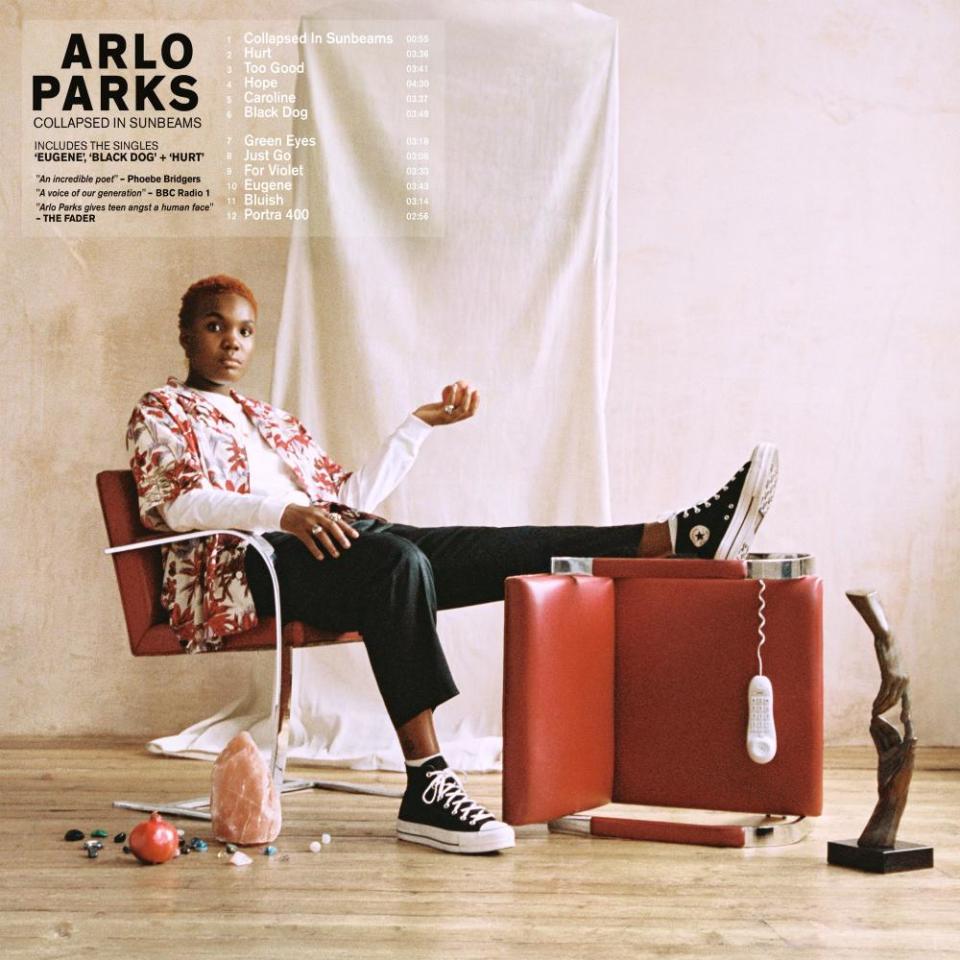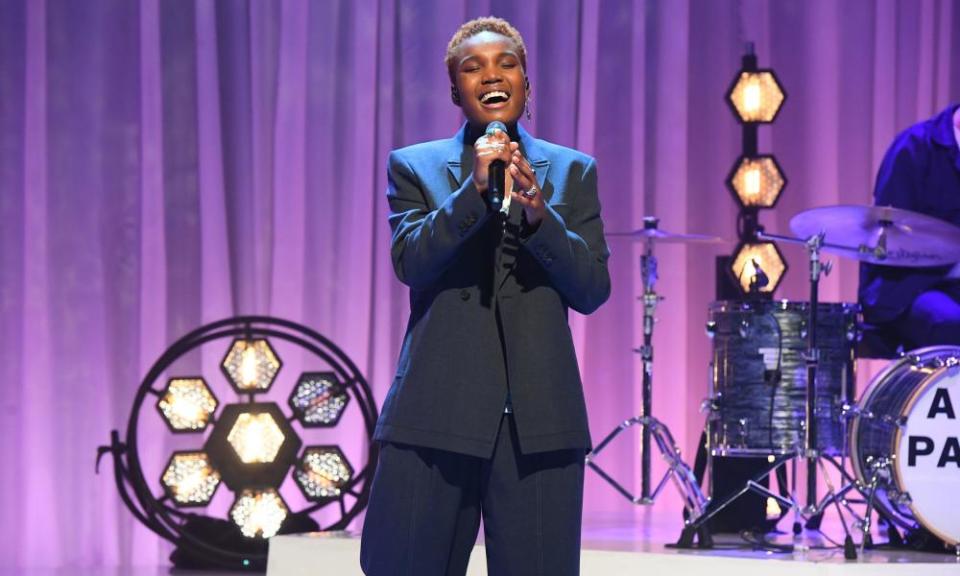Arlo Parks: Gen Z star entrances all who hear her

There were fewer than a dozen people out in east London on a Saturday night in Paper Dress Vintage when Arlo Parks arrived on stage. The clothes shop by day turned live music venue by night had the then 17-year-old second on the bill, where she performed with a band made up of schoolfriends. Most of the audience were mates from sixth form. But there was also a scout from Transgressive Records; he spent the first half of the show in total dismay.
“It just wasn’t very good,” said Mike Harounoff apologetically. As the artists and repertoire manager for Transgressive, Harounoff’s job is to find and bring in talent to sign. He had high expectations for Parks – her manager was a friend – and he had already hyped up the teenager to his colleagues. “No discredit to the band, they were just kids,” he told the Observer, “but it didn’t click. It was bad.”
Halfway through, the band shuffled off the stage, leaving their frontwoman to perform solo with her laptop. Parks delivered her poetry against beats she had made on Garageband. Harounoff was floored. By the end of the show, he was willing to bet the house on this quietly introspective west Londoner and spent the next couple of months battling bigger, more moneyed labels in the frenzy to sign her.
Less than three years later and Parks has released a debut album – Collapsed in Sunbeams – to a near-perfect run of reviews. She has been hailed by the music and style press as a Gen Z icon. Billie Eilish and Lily Allen declared themselves early and enthusiastic fans. Michelle Obama put Parks on her public summer playlist, while Elton John declared himself “so in love” with Sunbeams that he invited the young star to join him on his Apple Music show Rocket Hour.
On Tuesday, still only 20, Parks is performing at the Brit awards, where she is up for breakthrough artist, British female artist and best British album. It has been an astonishing rise for an artist still getting to grips with the mass of fans she has won over, famous or otherwise.
“This wasn’t even something that I had a secret hope for, or in my mind at all,” said Parks last month. “I never expected to reach any level of commercial success … I expected to just be at uni, doing English literature at [University College London].”
Parks, born Anaïs Oluwatoyin Estelle Marinho, grew up in Hammersmith, west London, in what she described as “a very open, very multicultural” family. Her British Nigerian father is an accountant and her Chadian French mother works in secondary schools. She still lives at home with her younger brother, conducting interviews with the international press from her bedroom, where prints of Jimi Hendrix, David Bowie and MF Doom hang neatly behind her.

She attended Latymer Upper, a private school where she said she played a lot of sport and kept her head buried in books. A love for literature came early; Parks has namechecked Allen Ginsberg, Sylvia Plath and Virginia Woolf as influences, while the title of her album was taken from a line in Zadie Smith’s On Beauty.
“I wasn’t part of the popular squad at all,” she said, describing herself as bookish and reserved until she was 16. “I am a black kid who can’t dance for shit, listens to emo music and currently has a crush on some girl in my Spanish class,” she wrote in her teenage journals. When she moved schools for sixth form, Parks found her tribe.
“I was surrounded by people who wanted to be rappers and art directors and curators,” she told the Independent in January. “Having that around me and doing my music made me more extroverted. I had loads of friends and was going to parties all the time, so that was a nice switch.”
Parks came out as bisexual in her late teens and her songs often pick at the drama and romance of her crushes. A baked-in melancholy has resonated especially hard on radio playlists in the past year. She describes her friendship group as “an array of different sexualities and gender identities” that made it easier to map her own sexuality.
“I was lucky the people around me were also figuring themselves out and living their realities and going into relationships with whoever they pleased,” she said.
“I never felt uncomfortable. I never felt like it was something I had to explain to them. People like to write that [my sexuality] made me sad and confused and angsty, but I never felt that. Of course, as a teenager, no one is 100% self-assured, but it was just never something that I lay awake at night thinking about.”
Parks has described herself as an empath, someone who carries an intensity of feeling and easily absorbs others’ emotions. “I found [a journal] from when I was 13 and it said: ‘I want to make music because I want to help people’,” she told the Guardian last year. “When you approach the world with such vulnerability and openness, people return that energy. It’s draining, but it fills me with a purpose. I wouldn’t trade it for anything.”
According to the Independent, her music “draws a line from Nick Drake to Erykah Badu, crisscrossing indie, folk, jazz and R&B without ever committing to either. She sings about sexual identity, queer desire, mental health, body image and the odd ketamine-hazed weekend with an easy poetry that has led her to being called ‘the voice of a generation’.”
“I am of that generation but I’m not speaking for that generation,” she has said, uneasy with the suffocating weight of expectation. “There are so many individuals. We’re not going to all have the same ways of being, or priorities, or personalities. If you look at other artists my age, people are making completely different music and have different goals.”

Toby L, the boss of Transgressive Records, remembers being “staggered” by Parks’s natural confidence on first listen. “It’s the quality of her voice and the subtlety of the delivery that is major,” he told the Observer. “She proves you can have a stunning singing voice and it doesn’t have to be projected at the highest octaves, it’s understated and confident, almost like someone speaking to you in a conversation rather than it being belted out.”
Paul Epworth, who produced two songs on Sunbeams, said that although Parks’s music was “forged in darkness”, it was not consumed by it. “It’s searching for light,” said Parks. “I find it harder to write about joy because it’s simpler. There’s more complexity in sad things. But I’m a defiant optimist.”
Her long-term co-writer and producer Gianluca Buccellati told the Observer the making of the album was “a ceremonial experience” stripped of mundane distractions – playing each other Radiohead and Elliott Smith, Miles Davis and Sister Sledge, watching anime and cooking pasta. They met through a mutual friend a couple of summers ago at a festival in Hyde Park and went on to a blues bar after the gig to geek out over music and musicians.
Parks and Buccellati have been refining her sound since their first session together delivered Cola, described by the New York Times as “a spare, hypnotic and precisely rendered snapshot of a relationship cratering.”
Related: Arlo Parks on her superpowered empathy: 'It's hard, but it's opened my heart'
“I remember thinking the bass reminded me of something from Voodoo and the drums had this crunchy Low End Theory energy,” said Parks of Buccellati’s instrumental track, referring to classic albums by D’Angelo and A Tribe Called Quest. She quickly jotted down lyrics, recorded both lead and harmony vocals, and, in 15 minutes, they’d finished. The song, Parks’s first official release, has since been streamed almost 20 million times on Spotify.
In March last year, the two rented an Airbnb flat in Hoxton and locked down together to write Sunbeams. “Arlo feels the vibrations,” said Buccellati. “I think we’re both fairly sensitive people and we’re both fairly observant people, we’ve tapped into this explosive creative energy between us. It’s just really lovely to see the results of that process, where we fully immersed ourselves, to create something we both believed in.”

 Yahoo Movies
Yahoo Movies 